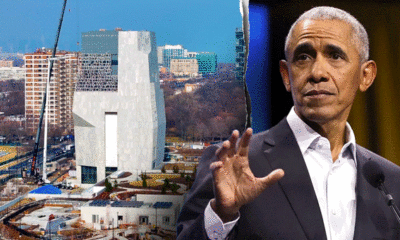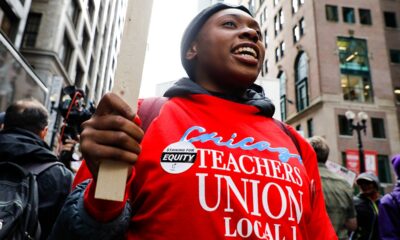Michigan
Jet skier will take to Lake Michigan to fundraise for good cause

Watch CBS News
Be the first to know
Get browser notifications for breaking news, live events, and exclusive reporting.

Michigan
“Trustworthy” AI consortium focused on ethics, security launches in West Michigan

GRAND RAPIDS, Mich. — Artificial intelligence is rapidly reshaping everything from classroom conversations to social media, and leaders at Grand Valley State University (GVSU) say West Michigan is positioning itself to help determine how the technology is used, responsibly.
The university’s College of Computing is launching the West Michigan Trustworthy Artificial Intelligence (AI) Consortium, aimed at helping businesses, researchers and the community better understand how to use artificial intelligence.
Right in the heart of Grand Rapids, along the Medical Mile, the consortium will meet at the Daniel and Pamella DeVos Center for Interprofessional Health (DCIH) every week, with quarterly meetings open to the general public.
The effort is aimed at helping West Michigan industries adopt AI that fits their specific needs, while problem-solving for security, bias, privacy, and ethical concerns.
Right in the heart of Grand Rapids, along Medical Mile, the consortium will meet at the Daniel and Pamella DeVos Center for Interprofessional Health (DCIH) every week, with quarterly meetings open to the general public. (Abigail Taylor/WWMT)
Marouane Kessentini, Ph.D, Dean of the GVSU College of Computing told News Channel 3 that a wide range of companies in the region are bringing forward questions of where, and how, to ethically integrate artificial intelligence into their practices.
“Here in West Michigan, we have a high concentration of many industries, health, manufacturing, and of course high-tech companies,” said Kessentini. “The first questions are about security, privacy, ethics and bias. It’s not just about deploying tools. It’s about deploying them responsibly.”
Kessentini said the consortium will focus on training, research and community education, with a heavy emphasis on data privacy, cybersecurity and misinformation.
“There are many examples where AI systems were trained on data that wasn’t diverse,” he said. “That can lead to inaccurate results. That’s why testing and training are critical.”
The consortium will bring together faculty researchers, students, and industry leaders, with weekly meetings planned to develop guidance for using AI at scale.
The goal is to help companies validate AI outputs, clean and manage data, and identify bias before systems are put into real-world use, especially in high-risk industries like healthcare and manufacturing.
Some projects will involve software design, others will focus on creating public data sets that are reliably sourced, but anonymized for safe use, and many more are yet to be ideated.
Some projects will involve software design, others will focus on creating public data sets that are reliably sourced, but anonymized for safe use, and many more are yet to be ideated. (Abigail Taylor/WWMT)
The initiative is backed by $1,031,000 in federal support, through the Community Project Funding (CPF) process, resources that U.S. Representative Hillary Scholten (D-MI-03) said she advocated for among members of congress in Washington.
“West Michigan should be leading the way in how artificial intelligence is developed and used, and that starts with investing in people and institutions we trust,” said Rep. Scholten. “This funding will help GVSU bring together educators, industry, and public partners to build AI systems that are ethical, secure, and transparent while preparing students for good-paying jobs and strengthening our region’s economy. I’m proud to support this work and to continue delivering federal investments that ensure West Michigan remains at the forefront of responsible innovation.”
It’s important that AI is useful, but also safe…
GVSU also launched an online certificate portal that is open for community members interested in learning about ethical AI use, for free.
Kessentini said the training is for the general public to learn how to navigate the technology, including the risks and limitations.
“It’s important that AI is useful, but also safe,” said Edgar Cruz, master’s student with a badge in cybersecurity.
Cruz is currently researching how AI systems can be attacked or manipulated with poisoned data, specifically as it relates to vehicle-to-vehicle communication, where AI helps self-driving cars exchange information like speed and position.
“We want to ensure that the system is robust and safe,” he said. “Because obviously people are involved.”
Kessentini said the consortium is designed to be a public resource, not just an academic project.
Quarterly community meetings will be open to the public, and training materials are available online through the College of Computing website.
“This is innovation with purpose,” he said. “We want to start here in Grand Rapids, but we want to make a global impact.”
Michigan
New Michigan O-line coach Jim Harding has one goal for spring practice

Jim Harding, Michigan’s new offensive line coach, has one goal coming out of spring practice: he wants to have a set starting five plus a solid sixth lineman for good measure.
Michigan begins spring practice March 17 and concludes with the spring game on April 18.
Harding, appearing on the Michigan in-house podcast, “In the Trenches” hosted by Jon Jansen, joined new Michigan head coach Kyle Whittingham’s staff from Utah, where Whittingham was head coach the last 21 years. Harding spoke about a number of topics, including returning to the Midwest — he grew up in Maumee, Ohio, and his wife is from Farmington Hills — and his love for the Detroit Tigers, but most important was his discussion about building the Wolverines’ offensive line.
“I’d like to establish the starting five where you feel good that when you go into fall camp,” Harding said on the podcast that posted Wednesday. “Those are the guys that are working together immediately from Day 1.”
Harding said he uses a sixth lineman — he terms that player the “rhino” — quite a bit and would like to have at least two ready to go. The Wolverines also need depth at center considering only Jake Guarnera has snapped in a game.
“And then just having that physicality, nastiness of the offensive line,” Harding said. “Just kind of develop that.”
Since arriving earlier this year at Michigan, Harding said he’s been impressed by the linemen and their desire to work hard on conditioning and developing their craft by asking questions and wanting feedback. They have gone to dinner as a group to get to know each other away from the facility, and Harding has enjoyed the process.
“The things that you can’t measure right now is our physicality or our toughness, things like that,” Harding said. “I’m confident that it won’t be an issue, but that’s kind of the next step once we get pads on, (finding out) who are kind of the Alpha dogs in the room that are going to set the tone for the unit, and then, obviously, the offense. But really pleased with what I’ve seen so far.”
Harding shared offensive coordinator Jason Beck’s approach to installing the offense.
“The way (Beck) runs it, everything’s on the table Day 1 in practice,” Harding said on the podcast. “So we’ll get a script with, if you count red zone, probably 60 or so plays, and any play can be called. It’s really unique, and I’d never done it this way, but Coach Beck, actually calls it like he does in the game. There are no scripts, and so we’ll just move the ball down the field, and if it’s a third play and it’s third and 3, well he’s going to call a third-and-3 call.
“So you really have to have the kids prepared for all 60 of those. And then the next day there’ll be maybe different formations and things like that once we get the concepts down in the O-line room for the run game. Now it’s just a matter of dressing up different things. It’s a lot of stuff early on, because every run scheme we have could be called on that first day, every pass protection we have could be called on that first day. So it’s a front-loaded installation.”
achengelis@detroitnews.com
@chengelis
Michigan
Bills to end concealed carry permit requirement introduced in Michigan House

LANSING, Mich. — A group of Republicans in the Michigan House say Michiganders’ second amendment rights are being infringed, as they introduce legislation to end requirements for concealed carry permits.
Right now, Michiganders must obtain a permit to carry a concealed gun, with a base fee of $100.
As part of the process, applicants must also receive training.
“The first thing they do is put you in a classroom, make sure you know all proper range and safety procedures, run you over what the law states about when and if you’re allowed to use your firearm,” Jonathan Hold, president of the Michigan chapter of Giffords Gun Owners for Safety and a firearms instructor, said. “It gives a really good grounding.”
Applicants must demonstrate four hours of range time as well.
The group of House Republicans feel this is an undue burden, noting many gun owners are already knowledgeable.
They also believe the current five-year felony for carrying without a permit is too steep.
“For the government of the state of Michigan to tell that that we have to be qualified under the guise of their rules in order to protect ourselves is a far cry from what the constitution provides for us,” Rep. Jay DeBoyer, (R- Clay) said.
The package of bills wouldn’t abolish permits, as they are necessary to take guns outside of the state, but it would institute what’s called “constitutional carry.”
That means Michiganders can carry a gun on them without a permit.
Twenty-nine other states already adopted such policies.
“When we exercise other first amendment rights like our right to speak, we do not have to get a permit or permission from the government to speak,” Rep. Jim DeSana (R- Carleton) said. “When we exercise our right to worship, we do not have to go get a permit or permission to go worship.”
Supporters say concealed guns are important for self-defense, and can also help stop crime.
“It’s going to encourage and increase safety for all,” Rep. Joseph Fox (R- Fremont) said. “It’s about protecting everybody because if there are guns in this situation, and people are worried for their lives, they’re gonna stay back away from evil and making bad choices.”
Gun control advocates like Gold, however, say it’s “ridiculous” not to have guardrails.
“We’re talking about the power of life and death at a distance,” Gold said. “To send an untrained user out into the world with a firearm is a mistake.”
He also takes issue with the constitution argument.
“The constitution says as part of a well regulated militia, if you read the second amendment, and we don’t have well regulated militias in this country,” Gold said. “At the very least, what we should have are trained firearms users.”
A similar effort to end concealed carry permits failed to gain traction last year in the Michigan Senate, and with the landscape unchanged, the bills likely have an uphill battle to become law.
-

 World1 week ago
World1 week agoExclusive: DeepSeek withholds latest AI model from US chipmakers including Nvidia, sources say
-

 Massachusetts1 week ago
Massachusetts1 week agoMother and daughter injured in Taunton house explosion
-

 Wisconsin3 days ago
Wisconsin3 days agoSetting sail on iceboats across a frozen lake in Wisconsin
-

 Maryland4 days ago
Maryland4 days agoAM showers Sunday in Maryland
-

 Florida4 days ago
Florida4 days agoFlorida man rescued after being stuck in shoulder-deep mud for days
-

 Denver, CO1 week ago
Denver, CO1 week ago10 acres charred, 5 injured in Thornton grass fire, evacuation orders lifted
-

 Massachusetts2 days ago
Massachusetts2 days agoMassachusetts man awaits word from family in Iran after attacks
-

 Oregon6 days ago
Oregon6 days ago2026 OSAA Oregon Wrestling State Championship Results And Brackets – FloWrestling
























